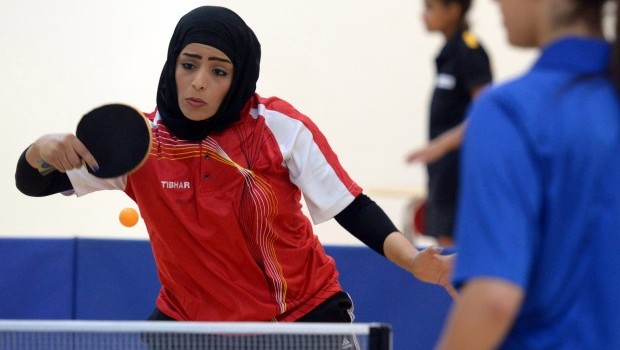
Al-Nadi Club’s table tennis player Kifaya Al-Awardi plays during the Women’s Games at Salwa Al-Sabah Sports Center in Qurein, Kuwait, on Thursday, May 9, 2013. The event is part of a new initiative launching sports leagues for women. (AP Photo/Gustavo Ferrari)
As part of a new initiative launching sports leagues for women, Shatti and her teammates from Salwa Al-Sabah club downed Qadsiya club 63–13 in a game that attracted several hundred male and female fans. The initiative to launch basketball, table tennis and athletic leagues for the first time in Kuwait illustrates how the landscape for women athletes is improving across the Gulf, where hard-liners have long opposed women playing sports.
Several of the players, in deference to the conservative Muslim culture that is common across the Gulf, wore leggings and covered their heads with hijab. Others, however, wore shorts and T-shirts.
“A competition like this should have happened a long time ago,” said Shatti, who has played in tournaments overseas and only heard about the league in her home country while playing in neighboring Bahrain. “But I am glad it finally took place. We’ve been trying to do this for a long time, and they have promised that more sports will be included in future leagues.”
Helped by government support, increased education and erosion of traditional values, football leagues for girls in the Gulf have started up in Qatar and United Arab Emirates.
Kuwait is typical of the struggle women have endured in the Gulf.
The 1970s were described as the golden era where women were allowed to freely participate in sports in Kuwait, according to Naeema Al-Sabah, the head of the Women’s Sports Federation. But in the ensuing decades, the influence of Islamic hard-liners grew in the country and sports for women all but disappeared. Hard-liners believe that sports will promote immoral behavior and that uniforms inappropriately reveal female bodies.
The low point came a few years back, when a Kuwaiti women’s football team was publicly denounced after returning from playing a regional tournament in neighboring United Arab Emirates.
“We’re taking baby steps toward progress,” Sabah said. “As with any society that is religiously strict, we need to test the waters and take small steps. Everyone in Kuwait now values sports. You see people walking and jogging every day. There is this increasing interest in playing sports in general.”
Shatti said the best sign that things are changing was the number of women and girls who turned out for the basketball game. A music teacher who also cycles and jogs with her husband, Shatti is only hoping to get more chances to play.
“It felt like the first step toward a better future for sports for us here in Kuwait,” she said after her team’s victory.
